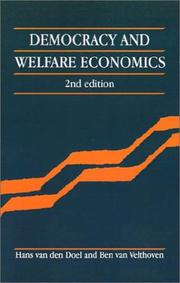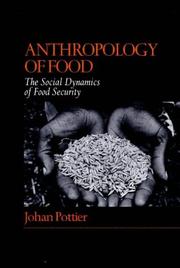| Listing 1 - 10 of 52 | << page >> |
Sort by
|

ISBN: 0333485394 0312120672 0333485386 9780312120672 Year: 1994 Publisher: New York (N.Y.): St. Martin's press,
Abstract | Keywords | Export | Availability | Bookmark
 Loading...
Loading...Choose an application
- Reference Manager
- EndNote
- RefWorks (Direct export to RefWorks)
Industrial sociology --- Industriële sociologie --- Sociologie industrielle --- Welfare economics --- Capitalism --- Economie du bien-être --- Capitalisme --- Industries --- Social aspects. --- Industrial sociology. --- Economie du bien-être --- Industry --- Social aspects --- Industries - Social aspects.
Book
ISBN: 2804012409 9782804012403 Year: 1997 Publisher: Bruxelles: Entre-vues & Labor,
Abstract | Keywords | Export | Availability | Bookmark
 Loading...
Loading...Choose an application
- Reference Manager
- EndNote
- RefWorks (Direct export to RefWorks)
Civilization --- Human comfort --- Ethics, Modern --- Civilisation --- Bien-être --- Morale --- Philosophy --- Philosophie --- Tocqueville, Alexis de, --- Qualité de la vie --- Sante publique. --- Environnement --- Démocratie --- Sciences --- Protection. --- Aspect social. --- Bien-être --- Environnement - Protection. --- Sciences - Aspect social. --- Sante publique
Book
ISBN: 1138259926 9781138259928 9780754672647 9780754688631 9781315584034 9781317130222 9781317130239 Year: 2009 Publisher: Farnham Ashgate
Abstract | Keywords | Export | Availability | Bookmark
 Loading...
Loading...Choose an application
- Reference Manager
- EndNote
- RefWorks (Direct export to RefWorks)
Well-being --- Bien-être --- Bien-être --- Qualité de la vie --- Sociology of the family. Sociology of sexuality --- Europe --- Sex discrimination against women --- Quality of life --- Discrimination à l'égard des femmes

ISBN: 0444864873 1322269823 148329059X 9780444864871 Year: 1983 Volume: 145 Publisher: Amsterdam: North-Holland,
Abstract | Keywords | Export | Availability | Bookmark
 Loading...
Loading...Choose an application
- Reference Manager
- EndNote
- RefWorks (Direct export to RefWorks)
Microeconomics --- Social choice --- Welfare economics --- Choix collectif --- Economie du bien-être --- Congresses --- Congrès --- congresses --- 316.323.65 --- -Welfare economics --- -Economic policy --- Economics --- Social policy --- Choice, Social --- Collective choice --- Public choice --- Choice (Psychology) --- Social psychology --- Verzorgingsstaat. Welvaartsstaat --- Congresses. --- -Verzorgingsstaat. Welvaartsstaat --- 316.323.65 Verzorgingsstaat. Welvaartsstaat --- -316.323.65 Verzorgingsstaat. Welvaartsstaat --- Economie du bien-être --- Congrès --- Economic policy --- Social choice - congresses --- Welfare economics - Congresses

ISBN: 0521430577 0521436370 0511559569 9780511559563 9780521430579 9780521436373 Year: 1993 Publisher: Cambridge : Cambridge university press,
Abstract | Keywords | Export | Availability | Bookmark
 Loading...
Loading...Choose an application
- Reference Manager
- EndNote
- RefWorks (Direct export to RefWorks)
This is a fully revised and updated version of Hans van der Doel's Democracy and Welfare Economics. It presents the economic theory of political decision-making (otherwise knownn as new political economy, or public choice), providing students with an accessible and clear introduction to this important subject. The authors identify four different methods of decision-making by which the political process transforms the demands of individual citizens into government policy and public goods and services: negotiation, majority decision, representations and bureaucratic implementation. These are analysed, in turn, as independent decision-making models whose effectiveness is examined with reference to economic theory. A final chapter draws conclusions from this analysis, arguing that the size of the public sector is a result of forces that work in different directions at different stages of the political process.
Microeconomics --- Bureaucracy --- Democracy --- Welfare economics --- Bureaucratie --- Démocratie --- Economie du bien-être --- welvaart en welzijn --- democratie --- economische theorieen --- prosperite et bien etre --- theories economiques --- Bureaucracy. --- Democracy. --- Welfare economics. --- Démocratie --- Economie du bien-être --- Economic policy --- Economics --- Social policy --- Self-government --- Political science --- Equality --- Representative government and representation --- Republics --- Interorganizational relations --- Public administration --- Organizational sociology --- Business, Economy and Management
Book
ISBN: 2701111838 9782701111834 Year: 1988 Publisher: Paris: Belin,
Abstract | Keywords | Export | Availability | Bookmark
 Loading...
Loading...Choose an application
- Reference Manager
- EndNote
- RefWorks (Direct export to RefWorks)
Human comfort --- Quality of life --- Architecture --- Bien-être --- Qualité de la vie --- Human factors --- Facteurs humains --- Habitations --- Progrès --- Bien-être. --- Luxe. --- Qualité de la vie. --- Hygiène. --- Architecture. --- Innovations --- confort --- Aspect social. --- Confort. --- Innovation. --- Progrès. --- Confort --- Habitation --- Hygiene --- Luxe --- Aménagement. --- Histoire --- Habitation. --- Hygiene. --- Bien-être --- Qualité de la vie

ISBN: 9780521368629 0521368626 0521363152 9780521363150 9780511572005 051157200X Year: 1989 Publisher: Cambridge: Cambridge university press,
Abstract | Keywords | Export | Availability | Bookmark
 Loading...
Loading...Choose an application
- Reference Manager
- EndNote
- RefWorks (Direct export to RefWorks)
Competition may not function well where technology calls for large and complex investments, as in the electrivity industry where public utilities often provide service. This book presents economic welfare foundations for the purpose of evaluating how well, from a social point of view, an enterprise performs when competition is unable to function. Problems with existing institutions are emphasized. Topics treated include welfare measures and their uses in peak-load pricing, second-best pricing, and income distribution. Professor Sherman covers public choice difficulties of government intervention, and describes problems with incentives in statutory monopolies and efforts to overcome them through the study of principal-agent relationships. Contestability and sustainable prices are also discussed, as well as effects of uncertainty and imperfect information.
Monopolies --- Welfare economics --- Monopoles --- Economie du bien-être --- Government policy --- Politique gouvernementale --- Economie du bien-être --- Concurrence --- Entreprises publiques --- Business, Economy and Management --- Economics --- Monopolies - Government policy --- Welfare economics. --- Government policy. --- Economic policy --- Social policy --- Combinations in restraint of trade --- Commercial corners --- Corners, Commercial --- Engrossing --- Forestalling --- Commercial crimes --- Trade regulation --- Competition --- Monopolistic competition --- Monopsonies --- Restraint of trade --- Trusts, Industrial --- Etat --- Monopole --- Regulation --- Tarification

ISBN: 272970504X 9782729705046 2729710418 Year: 1994 Publisher: Lyon: Presses universitaires de Lyon,
Abstract | Keywords | Export | Availability | Bookmark
 Loading...
Loading...Choose an application
- Reference Manager
- EndNote
- RefWorks (Direct export to RefWorks)
Le confort est à la mode. Hier encore secteur spécifique possédant son propre univers de référence, le confort est aujourd’hui à l’œuvre dans tout le social, en fonction d’enjeux et d’intérêts divers et complexes le constituant comme un phénomène social à part entière. Le confort n’est ainsi plus uniquement à comprendre comme une valeur emblématique de la modernité, autrement dit comme l’un de ses modes privilégiés de représentation et de légitimation, mais comme l’une de ses instances productrices de son sens. En définissant le confort comme une forme sociale, il est possible de rendre compte de la complexité du phénomène et de ses formes tout en affirmant la place et le rôle fondamentaux tenus par cette notion à l’heure actuelle au sein d’une société en pleine redéfinition, en quête de valeurs et de sens.
Human comfort --- Bien-être --- Quality of life. --- Human comfort. --- Bien-être --- Comfort, Human --- Creature comfort, Human --- Senses and sensation --- Human engineering --- Quality of life --- Life, Quality of --- Economic history --- Human ecology --- Life --- Social history --- Basic needs --- Social accounting --- Work-life balance --- norme sociale --- modernité --- phénomène social --- progrès --- confort --- Confort --- Qualité de vie --- France --- 19e-20e siècles --- Sociologie --- Conditions sociales

ISBN: 0745615333 0745615341 9780745615349 Year: 1999 Publisher: Cambridge: Polity press,
Abstract | Keywords | Export | Availability | Bookmark
 Loading...
Loading...Choose an application
- Reference Manager
- EndNote
- RefWorks (Direct export to RefWorks)
Food --- Food supply --- Agriculture and state. --- Welfare economics. --- Aliments --- Politique agricole --- Economie du bien-être --- Social aspects. --- Government policy. --- Aspect social --- Approvisionnement --- Politique gouvernementale --- Economic anthropology. --- Economic security. --- Food relief --- Economic aspects. --- Social Sciences and Humanities. Development Studies --- Food Policy --- Food Security --- Food Security. --- Economie du bien-être --- Food - Social aspects. --- Food supply - Government policy. --- Food supply - Economic aspects. --- Food relief - Government policy.
Book
ISBN: 9780745328621 9780745328614 074532861X 0745328628 1849644209 9781849644204 Year: 2009 Publisher: London : Pluto Press,
Abstract | Keywords | Export | Availability | Bookmark
 Loading...
Loading...Choose an application
- Reference Manager
- EndNote
- RefWorks (Direct export to RefWorks)
Argues that global wealth inequalities need to be addressed to achieve lasting social and economic development in all countries.
Distributive justice. --- Finance, Public. --- Taxation. --- Welfare economics. --- Impôt --- Finances publiques --- Economie du bien-être --- Justice distributive --- Distribution (Economic theory) --- Justice --- Social justice --- Wealth --- Economic policy --- Economics --- Social policy --- Cameralistics --- Public finance --- Currency question --- Duties --- Fee system (Taxation) --- Tax policy --- Tax reform --- Taxation, Incidence of --- Taxes --- Finance, Public --- Revenue --- Moral and ethical aspects --- Public finances --- armoede --- belastingen --- internationale solidariteit
| Listing 1 - 10 of 52 | << page >> |
Sort by
|

 Search
Search Feedback
Feedback About UniCat
About UniCat  Help
Help News
News